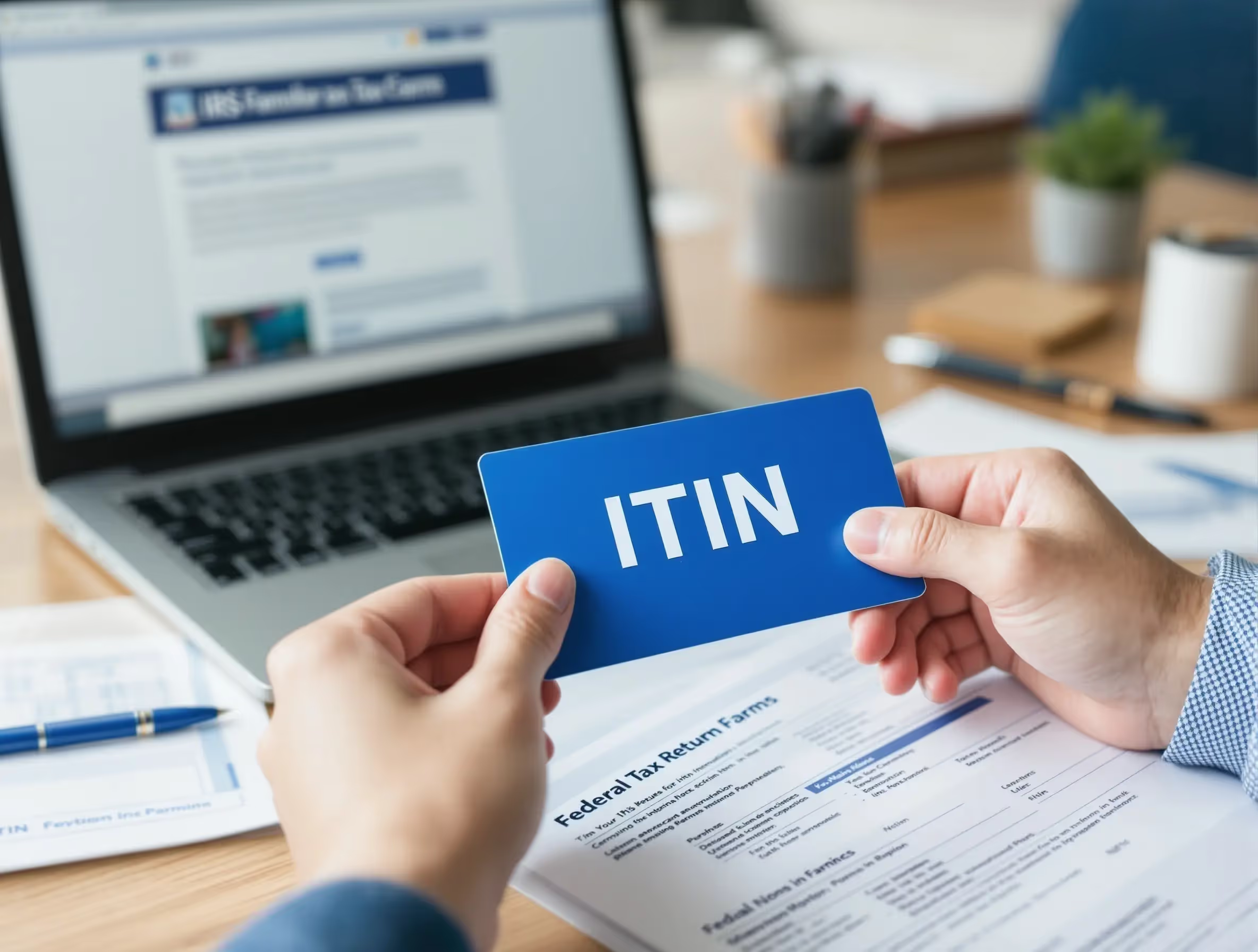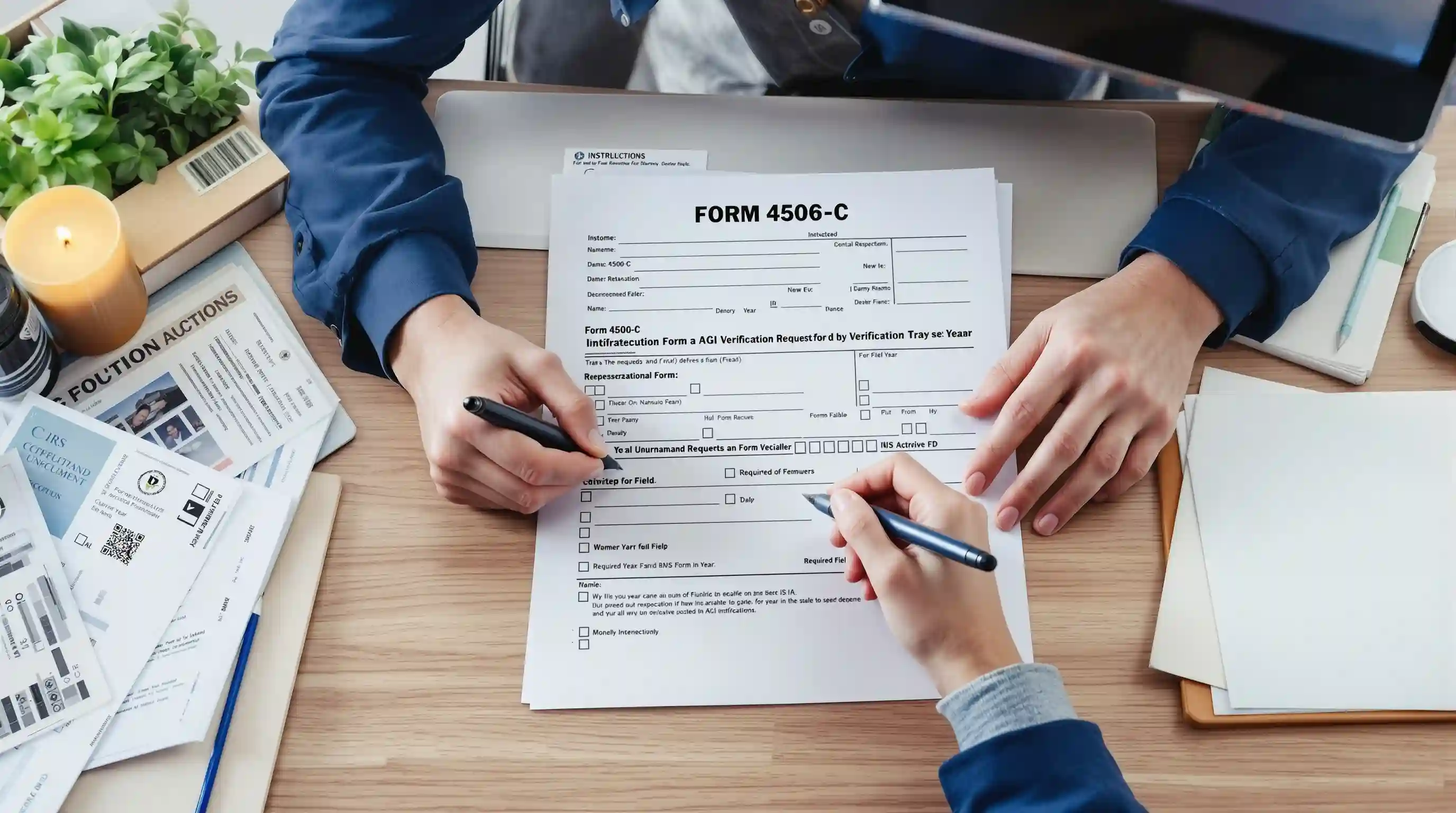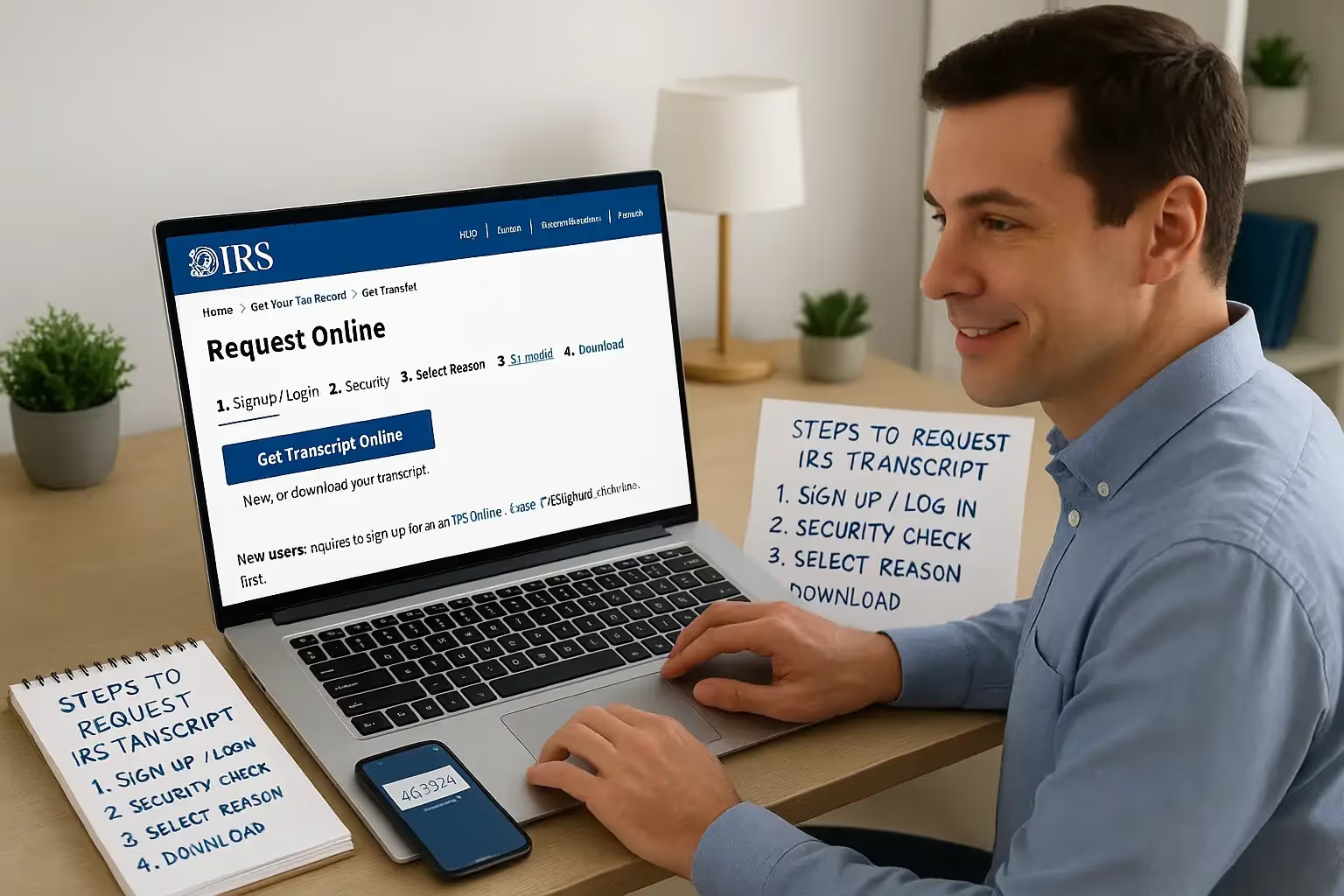
The Internal Revenue Service (IRS) issues an Individual Taxpayer Identification Number (ITIN) to people who must file a federal income tax return but cannot get a Social Security Number (SSN). Millions of foreign nationals, resident aliens, students, and undocumented immigrants rely on this taxpayer identification number to meet their federal tax obligations. An ITIN is a nine-digit tax processing number issued by the Internal Revenue Service for tax purposes only. It does not authorize work, provide access to Social Security benefits, or change immigration status, but it is critical for compliance with U.S. tax laws.
For many households, the most important impact of an ITIN is how it limits access to refundable tax credits. Families filing a federal tax return may depend on programs like the Child Tax Credit (CTC), Additional Child Tax Credit, and the Earned Income Tax Credit (EITC) to increase their refund amount. Other programs, such as the American Opportunity Tax Credit for qualified education expenses and the Dependent Care Tax Credit for dependent care expenses, can provide financial relief. However, ITIN holders face restrictions on which credits they can claim, directly affecting tax returns filed and reducing eligibility for thousands of dollars in refunds each tax year.
This guide explains the full scope of ITIN information: how it impacts refundable credits like Child Tax Credit and Earned Income Tax Credit, how it affects eligibility requirements for each tax credit, how to complete an ITIN application with original supporting documents like a driver's license or passport, when ITIN renewal is required, and what to do if the IRS rejects your submission. Whether you are filing jointly, claiming a qualifying child, or advising clients as a tax professional, you will find detailed information on avoiding common IRS issues, complying with requirements from federal agencies, and protecting your taxpayer information.
What Is an IRS Individual Taxpayer Identification Number
Understanding ITIN
An ITIN is your tax identification when you cannot obtain a Social Security Number. The IRS created these for people who owe U.S. taxes but are not eligible for SSNs. Having an ITIN allows you to file taxes legally, but does not provide work authorization or make you eligible for Social Security benefits.
All ITINs start with nine and follow this pattern: 9XX-XX-XXXX. You can only use your ITIN for tax purposes—not for obtaining a driver's license, opening bank accounts, or applying for government programs requiring Social Security Numbers. This limitation becomes important when you attempt to claim certain tax benefits.
Why ITIN Limitations Impact Refundable Credits
Congress limited some tax credits to people with Social Security Numbers only. This primarily affects two major credits: the child tax credit and the earned income tax credit. The rules impact parents with ITINs and children with ITINs, even when the rest of the family has Social Security Numbers.
These limitations can result in significant financial losses for your family. Families may lose thousands of dollars in refunds that similar families with Social Security Numbers receive. The government established these rules to control benefit eligibility for these programs, but they create a significant financial burden for mixed-status families.
ITIN Refundable Credit Limitations Explained
Child Tax Credit (CTC) Restrictions
Children with ITINs cannot qualify you for the child tax credit. This rule runs from 2018 through 2025, eliminating up to $2,000 per child from your potential refund. You lose the regular credit that reduces your taxes and the additional child tax credit that can create a refund when you owe nothing.
- Primary restriction: No child tax credit for children with ITINs, regardless of age or residency duration. You forfeit one of the most valuable family tax benefits available.
- Alternative benefit: The Credit for Other Dependents provides $500 per child with an ITIN. This credit does not create a refund but only reduces the taxes you already owe.
Earned Income Tax Credit (EITC) Restrictions
ITIN holders are entirely excluded from the earned income tax credit. If you have an ITIN, you cannot claim this credit regardless of your income level or the number of children you support. You still receive no EITC benefits if you have a Social Security Number, but your children have ITINs.
- Complete exclusion: EITC remains unavailable when you file with an ITIN. This credit can be worth over $7,000 for large families, representing a substantial loss.
- Mixed family impact: Parents with Social Security Numbers cannot count their children with ITINs when calculating EITC benefits. If even one child has an ITIN, the family cannot claim the Earned Income Tax Credit.
Credits You Can Still Claim with an ITIN
You do not lose every tax credit when you have an ITIN. Several credits remain available and can reduce your tax liability, though they function differently from the major refundable ones.
- American Opportunity Tax Credit: College students can receive up to $2,500 per year for tuition and fees, with $1,000 potentially refundable. This helps offset education costs while providing some cash benefits to ITIN holders.
- Dependent Care Tax Credit: Working parents can claim up to $3,000 for child care expenses (more for multiple children). This credit reduces your tax bill but cannot create a refund.
Who Needs an ITIN?
Primary Applicants
You need an ITIN to file U.S. taxes, but cannot obtain a Social Security Number. This covers foreign nationals earning money here, spouses of U.S. citizens who want to file joint returns, and anyone claiming benefits under tax treaties. The IRS requires you to demonstrate a legitimate tax reason for needing the number.
- Tax filing requirement: Anyone who owes U.S. taxes but lacks Social Security Number eligibility must obtain an ITIN first. This maintains legal compliance while handling your tax obligations properly.
- Treaty benefits: Foreign nationals reduce their tax bills through treaties, and they need ITINs even when they are not required to file returns. The ITIN allows you to claim lower withholding rates and other treaty advantages.
Common Scenarios Requiring ITINs
International students often need ITINs when they work as teaching assistants or research helpers. Investors from other countries need them for rental income, stock dividends, or business profits. Family members of U.S. taxpayers typically need ITINs when claimed as dependents or spouses on joint returns.
- Student workers: International students cannot obtain Social Security Numbers during their first five years here without work authorization, but they still owe taxes on their earnings. ITINs solve this problem while maintaining their student status.
- Foreign family members: Spouses and children from other countries need ITINs when included on U.S. tax returns. This allows families to file together and legally claim all their dependents.
How To Apply For an ITIN
Step 1: Determine Eligibility Requirements and Need
You must prove you have a legitimate reason for needing an ITIN before the IRS will issue you one. Most people qualify by needing to file a federal tax return, but you might also qualify for claiming treaty benefits or being claimed as someone else's dependent. The IRS requires documentation showing why you cannot obtain a Social Security Number and what tax purpose the ITIN serves.
Step 2: Gather Required Documentation
Your foreign passport serves as the preferred form of identification—just one document will suffice. Without a passport, you need at least two other documents from the IRS list, such as a national ID card, driver's license, or birth certificate. All documents must be current and show your legal name exactly as it appears on your tax forms.
Step 3: Complete Form W-7
Fill out Form W-7 carefully, ensuring every detail matches your supporting documents exactly. Select the appropriate reason for applying, write your address clearly, and sign where required. Most applications get rejected for mismatched names, incomplete addresses, missing signatures, or incorrect reason codes.
Step 4: Submit Application Package
Mail your completed Form W-7, tax return, and original documents to the IRS processing center in Austin, Texas. You can also visit an IRS office in person or use a Certified Acceptance Agent who can verify your documents without requiring you to mail originals. CAAs often process applications faster and protect your important papers from loss.
ITIN Renewal Requirements and Deadlines
When ITINs Expire
ITINs automatically expire if not used on a tax return for three consecutive years. The expiration occurs on December 31st of that third year, making your ITIN invalid for future filings. Some older ITINs expired under special rules between 2017 and 2020, regardless of whether you used them.
- Three-year rule: If you skip filing for three consecutive years, your ITIN becomes invalid automatically. The IRS implements this to clean up unused numbers and encourage people to stay current with their taxes.
- Special expiration dates: ITINs issued before 2013 with certain middle digits had to be renewed by specific deadlines. This update includes security features and brings all ITINs up to current standards.
Renewal Process
Renewing an ITIN works like applying for a new one—you file Form W-7 marked as a renewal, include your current tax return, and provide fresh supporting documents. Even if your old documents remain valid, the IRS requires new ones to verify your current information. Processing takes the same seven to eleven weeks as new applications.
- Fresh documents required: You need current identification papers for renewal, even if your old ones have not expired. This proves your information stays accurate and meets current security standards.
- Include your return: Most renewals must include your current year's tax return unless you qualify for specific exceptions. This demonstrates that you actively file taxes and still need the ITIN.
Becoming a Certified Acceptance Agent (CAA)
CAA Requirements and Benefits
Certified Acceptance Agents complete specialized IRS training on ITIN rules and document verification. The IRS conducts background checks and establishes professional standards for those seeking this designation.
Being a CAA allows you to verify clients' documents in your office instead of requiring them to mail originals to the IRS, which speeds up processing and protects important documents.
- Training required: Everyone responsible for CAA work must pass IRS courses on ITIN procedures and document authentication. This ensures CAAs know current rules and can assist clients properly.
- Document protection: CAAs verify original documents and send copies with certificates to the IRS instead of mailing originals. This prevents clients from losing irreplaceable documents like passports or birth certificates.
Step-by-Step CAA Application
Start by taking the required training courses through the IRS online system. After finishing training, submit your electronic application through IRS e-Services with details about your business and staff. The IRS then conducts background checks and verifies your professional licenses, taking up to two months for final approval.
Practical Examples and Edge Cases
Mixed-Status Families
A parent with a Social Security Number has two children—one with an SSN and one with an ITIN. The parent can claim the full $2,000 child tax credit for the child with the SSSNN, but only receives a $500 Credit for Other Dependents for the child with the ITIN. Additionally, having one child with an ITIN eliminates the entire family's earned income tax credit, even though they would otherwise qualify.
Foreign Students on F-1 Visa
Graduate students on F-1 visas who teach classes or conduct research for pay must file tax returns when they earn more than the filing threshold. These students cannot obtain Social Security Numbers during their first five years in the U.S., so they need ITINs. Many qualify for tax treaty benefits that reduce their taxes, but they need an ITIN to claim those benefits.
Nonresident Investors
Foreign investors who buy U.S. stocks or real estate face different tax rules depending on what they own and how much they earn. Many need ITINs to claim treaty benefits that reduce the withholding on their investment income. Getting the documentation right for foreign status and treaty eligibility saves significant money on U.S. taxes.
Common Rejection or Misapplied ITIN Scenarios
Applications are often rejected for insufficient documents, expired IDs, or incomplete forms. Information that does not match between your form and documents causes problems as well. Other issues include missing signatures, illegible handwriting, or selecting incorrect reason codes that do not fit your documentation.
Troubleshooting Common ITIN Problems
Document-Related Issues
Problems usually start with expired identification or documents not meeting IRS standards. Your documents need clear photos and official seals when required. Certified copies must come directly from the government agency issuing them and include the proper certification language that the IRS accepts.
- Current documents only: When you submit your application, all identification must be current and not expired. Expired documents cannot verify your current identity and will result in application rejection.
- Proper certification: Certified copies need specific language and must come from authorized agencies. Poor certification can delay your application or cause rejection.
Processing Delays
Applications take longer during tax season, from January through April, when the IRS experiences high volume. International applications often require additional time because the IRS needs to verify foreign documents. Incomplete applications require back-and-forth correspondence that adds weeks or months to processing.
- Delays during peak filing season: Because of the higher volume, tax season applications can take eleven weeks instead of seven. Filing during quieter months produces faster results.
- Complete applications first: Missing information forces the IRS to send letters requesting additional details. Complete applications the first time to avoid these delays entirely.
Renewal Complications
Expired ITINs cannot be used on tax returns, which delays your refund and creates compliance problems. You must renew expired ITINs before filing your return, often meaning you need a filing extension to allow the renewal time to process. Starting early prevents these timing problems.
- Cannot use expired ITINs: Tax returns with expired ITINs get rejected automatically, forcing you to correct the problem and refile. This delays your refund by months and creates unnecessary complications.
- Extension planning: Form 4868 provides additional time to renew your ITIN before your final filing deadline. Extensions coordinate the timing between renewal and filing requirements.
Risks of Ignoring ITIN Requirements
Financial Consequences
Ignoring ITIN rules results in monetary losses through forfeited credits, delayed refunds, and late-filing penalties. Families lose thousands annually when ITIN problems prevent proper filing. Processing delays from ITIN issues can delay refund payments by several months, creating cash flow problems when you need the money.
- Lost credits: Improper ITIN status eliminates legitimate tax credits worth thousands of dollars annually, creating a significant financial burden for families counting on these benefits.
- Delayed refunds: ITIN processing problems delay tax returns and push refund payments months past normal timing. These delays hurt families expecting refunds to pay bills or cover expenses.
Compliance Risks
Filing returns with invalid ITINs results in rejection by IRS computers, forcing you to correct problems and refile. Claiming credits you cannot legally obtain triggers audits and examinations that cost time and money. Repeated ITIN compliance problems make future applications more difficult and require additional documentation.
- Automatic rejection: Invalid ITINs cause immediate return rejection, requiring corrections and resubmission with additional delays. This creates extra steps and extends tax compliance timing.
- Audit risk: Incorrect credit claims or improper ITIN use increase your chances of IRS examination. This can mean expensive professional help and time-consuming correspondence.
Legal and Immigration Implications
ITINs do not change your immigration status, but proper tax compliance demonstrates good character for immigration purposes. Immigration officials review tax compliance during green card applications, citizenship proceedings, and visa renewals. Keeping your ITIN current supports your overall legal compliance record.
Timelines and Deadlines
ITIN Application Deadlines
For most people, new ITIN applications accompany their federal tax return by April 15th. You can request additional time with Form 4868 when you need more time for ITIN processing. Renewal applications should start early in the tax year so processing finishes before filing deadlines.
Processing Timelines
Standard processing takes seven weeks after the IRS receives your complete application. Because of higher volume, peak season applications from mid-January through April can take nine to eleven weeks. International applications and those needing additional verification often take longer than normal.
Important Annual Dates
January 1st starts each tax year and marks when unused ITINs might expire. April 15th is the main filing deadline for federal tax returns and ITIN applications. October 15th provides the extended deadline for people who filed for additional time earlier.
Next Steps
For Individual Taxpayers
Determine whether you need a new ITIN, must renew an existing one, or might qualify for a Social Security Number instead. Gather all your documents before starting the application to prevent delays. Complex situations with multiple family members or unusual circumstances work better with professional assistance.
- Prepare documents: Before starting your application, collect all required papers and verify that they are current. This will prevent rejections and speed up processing.
- Professional assistance: Complex family situations or unusual circumstances benefit from expert guidance to avoid mistakes. Tax professionals navigate complex requirements and prevent costly errors.
For Tax Professionals
Adding ITIN services helps underserved immigrant communities while creating new income for your practice. Consider becoming a Certified Acceptance Agent to offer comprehensive ITIN services, including document verification. Stay updated on changing tax laws and ITIN procedures to provide clients with accurate advice.
- Certified Acceptance Agent (CAA) status: This allows professionals to provide complete ITIN services while protecting clients' original documents. This creates competitive advantages and better client service.
- Continue education: Regular updates on ITIN rules and international tax changes ensure accurate client service. Staying informed builds expertise in this specialized field.
Frequently Asked Questions
Can I claim the Child Tax Credit with an ITIN?
Children with ITINs cannot qualify you for the Child Tax Credit (CTC) or Additional Child Tax Credit through 2025. Only children with valid Social Security Numbers are eligible for these credits. Instead, you may claim the Credit for Other Dependents worth up to $500 per child with an ITIN, but this benefit is smaller and non-refundable.
Why are ITIN holders excluded from the Earned Income Tax Credit?
The Earned Income Tax Credit (EITC) is restricted to taxpayers and children with valid Social Security Numbers. Congress limited eligibility to ensure benefits go only to work-authorized individuals. This means taxpayers with ITINs cannot claim the EITC, and children with ITINs cannot count as qualifying children. The law is designed to control eligibility for this specific federal tax benefit.
How long does it take to get an ITIN issued by the IRS?
Once the IRS receives a complete package, processing an ITIN application generally takes about seven weeks. During peak season from January through April, processing often extends to nine or eleven weeks. International applications may require additional time for document verification. Using a Certified Acceptance Agent (CAA) helps prevent mistakes, ensure accurate submissions, and avoid delays in the renewal or approval process.
Can I file my tax return before getting an ITIN?
No, you cannot file your federal return without an ITIN if you are required to have one. For first-time applicants, Form W-7 and your federal income tax return must be submitted. If more time is needed, you can request an extension using Form 4868 and note “ITIN TO BE REQUESTED” in the identification field.
What happens if my ITIN number expires?
If your ITIN expires, you cannot use it on a federal tax return, and the IRS will reject the filing. This creates refund delays and possible compliance issues. Renewal is required before submission, and the process involves filing Form W-7 as a renewal, submitting current identification documents, and attaching your federal tax return. Processing generally takes seven to eleven weeks.
Can my spouse or dependents get an ITIN if I have a valid SSN?
Yes, spouses and dependents may obtain ITINs even when the primary taxpayer has a Social Security Number, provided they have a valid tax purpose. This is common when filing jointly with a non-citizen spouse or claiming dependents who are not eligible for SSNs. Each person must complete their own Form W-7 and provide proper identification and supporting documentation.
















.avif)













































































